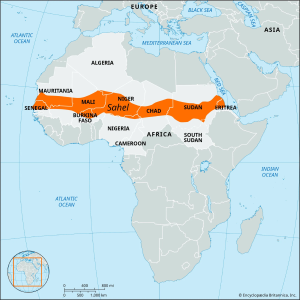Source: www.persecution.org
Date: August 2, 2023

Niger (International Christian Concern) – A military coup in Niger ousted the elected government of President Mohammed Bazoum amid regional security concerns. The coup could potentially aggravate the ongoing persecution of Christians in the Sahel as state actors in Muslim-majority nations and non-state actors, such as Islamic extremists, expand their reach.
Across northern and western Africa, instability and insecurity persist, from insurgent groups operating in Nigeria to the full-scale civil war in Sudan. Amid protracted regional conflicts, the church in affected countries faces increased likelihood and severity of hardships as the situation devolves.
On July 26, a group of Nigerien army officers declared on state television that the self-proclaimed “National Council for the Safeguarding of the Country” had assumed control of the institutions “as a result of the continuing degradation of the security situation, the bad economic and social governance,” according to the Reuters. It was not immediately clear whether Nigerien security forces at large supported the rebelling army officers who surrounded the presidential palace and detained President Bazoum.
On July 27, the Nigerien army command stated its support for the coup, citing concerns about potential instability and warning against intervention by foreign state actors. The news of the apparent success of the coup came amid international repudiation. The same day, UN Secretary-General Guterres called on the coup plotters to release Bazoum “immediately and without conditions.” U.S. officials called the coup an effort “to detain or subvert the functioning of Niger’s democratically elected government,” and French, German, and U.K. officials joined in censuring the coup.
On July 28, General Tchiani, commander of the Nigerien presidential guard, declared himself head of the interim government of Niger. Tchiani cited “the gradual and inevitable demise” of the security situation in the country as justification for the coup, according to Al Jazeera.
On July 30, the Economic Community of West African States (ECOWAS) imposed sanctions on the coup plotters and stated it would take “all measures necessary” to restore the elected government in Niger.
On July 31, Burkina Faso and Mali issued a joint statement warning that “any military intervention against Niger would be tantamount to a declaration of war against Burkina Faso and Mali,” according to Deutsche Welle.
The coup in Niger raises concerns about the future of the Sahel region after a series of eight coups across the region within the past five years: Burkina Faso in January and September 2022, Chad in April 2021, Guinea in September 2021, Mali in August 2020 and May 2021, and Sudan, in April 2019 and October 2021. The map shows the Sahel region in a political map of the African continent:

Source: “Sahel,” Encyclopædia Britannica, https://www.britannica.com/place/Sahel#/media/1/516438/281188 (accessed 01 August, 2023).
The nations in the Sahel region have struggled to maintain stability and security, facing the insurgent threat of Islamic extremist groups, namely Boko Haram, ISIS in the Greater Sahara (ISIS-GS), and an Al-Qa’ida affiliate known as Jama’at Nusrat al-Islam wal-Muslimin (JNIM). More than 1,800 terrorist attacks occurred in the region in the first six months of 2023, resulting in almost 4,600 deaths, according to information from the UN Security Council. This comes after the African continent emerged as the focal point of global terrorism, as International Christian Concern (ICC) reported.
The coup potentially jeopardizes the continuation of Western humanitarian and security operations—primarily counterterrorism—in the Sahel after Mali and Burkina Faso expelled French security forces in 2022 and 2023, respectively. This comes after the Malian government dismissed the UN peacekeeping mission of 15,000 personnel for allegedly failing to accomplish its objectives in the country.
As of 2021, the U.S. government had provided the Nigerien government with more than $500 million USD in military aid since 2012. Approximately 1,000 U.S. and French security forces remain in Niger, and the U.S. also operates a drone base in northern Niger, all of which now face an uncertain future after the coup.
Some analysts believe that Russian involvement via the Wagner group in Western Africa may increase as Western influence in the region recedes. Crowds of Nigeriens gathered in Niamey after the coup, waving Russian flags and chanting support for the Wagner group, according to the Associated Press.
HOW TO PRAY: Pray for protection for Niger’s Christian community. Pray for godly leaders to be elected in Niger. Pray for the gospel to spread throughout the region.
